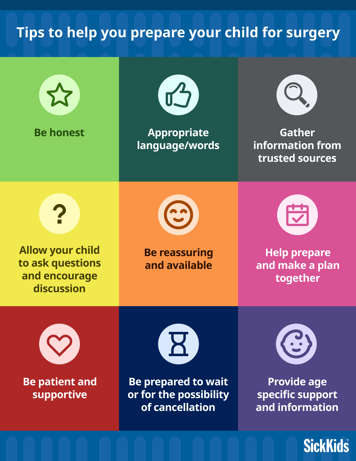Tips to help you prepare your child for surgery

Be honest
Help your child understand what is going to happen and why, to the best of your ability. Being honest builds trust.
Use appropriate language/words
Try to use language your child will understand. This helps them feel prepared.
Gather information from trusted sources
AboutKidsHealth is SickKids' health education website. For more resources like this on preparing you and your child for surgery, please visit the Coming for Surgery Learning Hub.
Allow you child to ask questions and encourage discussion
You do not have to know the answer, but let your child know you will help them find the answers by writing down their questions and speaking with the surgical team.
Be reassuring and available
The health-care team recognizes caregivers may also need support and reassurance, which the health-care team is happy to provide for them.
Help prepare and make a plan together
Having surgery can feel like losing a sense of control for children. Making a plan together and making sure you allow them control of decisions when possible will go a long way to provide reassurance.
Be patient and supportive
Unexpected behaviours can arise in times of stress. Give your child time and support, and know these changes will usually improve after the stressful time has passed.
Be prepared to wait or for the possibility of cancellation
Sometimes surgery may be delayed or canceled because of emergencies. If this happens, we will let you know as soon as possible.
Provide age specific support and information
Children at different ages have different needs aas they prepare for their surgical journey. See the article How to prepare for surgery based on your child's age for more information for your child's specific age range.
Surgery preparation do's and don'ts
| Do's | Don'ts |
|---|---|
| Talk to your child about the surgery and encourage your child to talk about the surgery and ask questions. | Give answers to questions you do not know the answers to. If you are not sure how to answer your child's questions, tell them that you do not know but will find out. You can write down the questions and ask your child's health-care team for more information. |
| You can learn a lot about how your child is feeling by watching your child play. Play "hospital" with puppets, dolls, and stuffed animals before and after the surgery. This can help your child understand and cope with the experience and will let you know how your child is feeling. If developmentally appropriate, ask your child to draw a picture about going to the hospital and write the story as they tell it to you. Then talk about the picture or read the story with your child. |
Make promises that you may not be able to keep about the surgery and the hospital. By giving accurate information only, your child will more easily adapt to any changes and be more trusting. |
| Explain to your child they will not feel, hear or see anything during the surgery because of a special "sleep medicine" called anesthetic. They will not wake up during the surgery but will wake up after it is over. Because many children have heard about a pet being "put to sleep" and never waking up again, do not use these words to describe the sleep medicine, instead, use explicit language such as “the health-care team use a special medicine to give you a special sleep during your surgery. With this medicine, you cannot see, hear or feel anything. When the surgery is finished, the health-care providers will wake you up from your special sleep.” | Promise your child that they will have no pain. Children have different amounts of discomfort after surgeries. Fear of pain is one of the most common fears about having surgery. Tell your child their health-care providers will give them medicine to help with any pain or discomfort they do not like after their surgery. |
| Give simple explanations using words your child understands. By answering your child's questions honestly, using simple language about coming to the hospital for surgery, you can help to correct any misconceptions or ideas your child may have. | Promise your child that there will be no needles. Most children in hospital do have a needle at some point. Tell your child that their health-care providers will show them that there are ways to make it easier to have a needle. If you are worried about your child being excessively stressed, find out if a child life specialist can support them through the process. |
| Explain that the surgery will help your child get better. Reasons given for the surgery can include such things as "help you grow," "help you stay strong and healthy" or "help a part of your body do its job." | |
| Prepare your child by telling them when they will have the surgery and how long the hospital stay will be. Let your child know that you will be able to stay as long as the health-care providers allow, and that the health-care team will take care great of them. | |
| Tell your child that they can bring a favourite toy or blanket to the operating room, and that it will be there when they fall asleep and when they wake up after the surgery. Knowing that they can have something special and familiar close by may help your child feel more relaxed before going to the hospital. | |
| Tell your child that while they are in the hospital, the health-care team will talk about what is going to happen and answer their questions. | |
| Request the support of a child life specialist if you do not feel that your child is coping well with their upcoming surgery. A child life specialist can support families in explaining and navigating hard things to children. |

